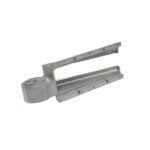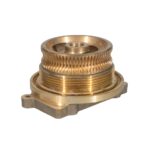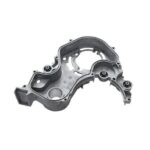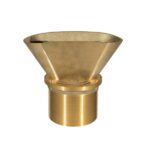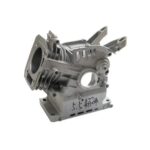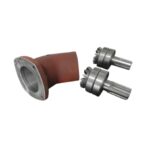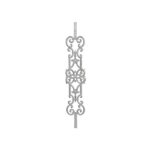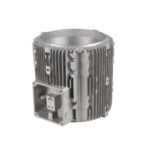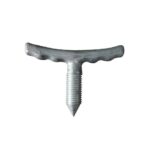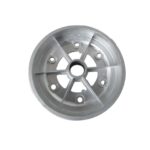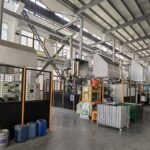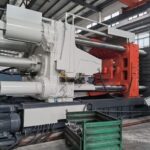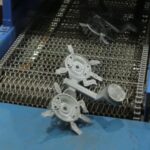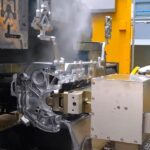Introduction
When it comes to electric motors, one component that often doesn’t get the spotlight it deserves is the motor housing. Think of it like the shell of an egg—it might seem simple, but its job is crucial.
Not only does it protect the delicate internal components, but it also impacts how well the motor performs over time.
In this article, I’ll walk you through everything you need to know about electric motor housing, why aluminum is quickly becoming the material of choice, and how to design a motor housing that ticks all the right boxes.
What is Electric Motor Housing?
The electric motor housing is like the armor of a motor. It surrounds the motor’s internal components, keeping them safe from things like dust, moisture, and physical damage.
But that’s not all—motor housing also plays a role in cooling the motor and ensuring it runs smoothly for years.
Searching for High-Quality for Cast Aluminum Parts?
You’ve come to the right place! Yongzhu Casting is a certified die casting manufacturer with over 20 years of expertise in the industry. We have successfully completed numerous die casting projects for Aluminum casting parts, particularly in your industry.
Design Review & DFM Support
Our professionals will evaluate your designs and provide suggestions for cost savings. Additionally, we offer Design for Manufacturing (DFM) assistance and conduct mold flow analyses to facilitate efficient production.
State-of-the-Art Manufacturing Equipment
Our facility is equipped with advanced hot-chamber and cold-chamber die casting machinery for aluminum and zinc production. We also utilize high-precision CNC machines in a temperature-controlled workshop, featuring 3-Axis, 4-Axis, 5-Axis, and 7-Axis setups to manage any project you have.
Rigorous Quality Control Measures
Our dedicated quality control team ensures that all parts meet the highest standards of quality and consistency. We employ high-accuracy measurement instruments, including CMM, spectrometers, and X-ray detectors.
Comprehensive Surface Treatment Options
We provide a variety of surface finishing techniques for your precision die casting components. Our in-house services include cleaning, polishing, anodizing, shot blasting, and painting.
Flexible Project Acceptance
While larger manufacturers often shy away from low-volume projects, and smaller ones may struggle with quality, Yongzhu Casting stands apart. We prioritize customer satisfaction and willingly accept high-mix, low-volume projects like yours.
Importance of Motor Housing in Electric Motors
You might think, “Why does housing matter so much?” Well, imagine running your car’s engine without a hood.
The internal parts would quickly degrade from exposure to outside elements.
Similarly, electric motor housing protects the motor, aids in heat dissipation, and even reduces noise. In short, it keeps everything running like a well-oiled machine.
Types of Electric Motor Housings
There are several types of motor housings available, depending on the specific needs of your motor and its environment. Let’s dive into the most common options.
Steel Motor Housing
Steel housings are tough and durable, often used in heavy-duty applications. But steel has its downsides—it’s heavy, and while it’s strong, it’s not always the most efficient option when weight matters.
Cast Iron Motor Housing
Cast iron offers excellent durability and wear resistance, which is why it’s used in rugged, industrial environments. However, like steel, cast iron is heavy, making it less ideal for applications where reducing weight is a priority.
Aluminum Electric Motor Housing
Aluminum motor housings are lightweight yet sturdy, offering a perfect balance between durability and performance. These housings have become increasingly popular in industries like automotive, industrial machinery, and home appliances. Let me explain why.
Aluminum Electric Motor Housing: A Preferred Choice
You may be wondering, “Why aluminum?” It’s simple—aluminum offers a range of benefits that make it perfect for motor housings.
Why Aluminum is Ideal for Motor Housings
As someone who’s worked closely with aluminum motor housings, I can confidently say that aluminum provides the ideal combination of strength and weight efficiency. It’s corrosion-resistant, which means it lasts longer in harsh environments. Plus, it’s incredibly thermally conductive, helping your motor stay cool, even during intense operation.
Here’s a quick look at what aluminum brings to the table:
| Property | Benefit for Electric Motors |
|---|---|
| Lightweight | Reduces overall motor weight, making it energy-efficient |
| Corrosion Resistance | Long-lasting protection, even in harsh environments |
| Thermal Conductivity | Efficient heat dissipation, preventing overheating |
| Cost-Effective | Affordable without compromising quality |
Motor Housing Design Considerations
When it comes to designing motor housing, there are several factors you need to keep in mind. The housing isn’t just a shell—it plays an active role in how the motor functions.
Factors Influencing Motor Housing Design
Here are a few key aspects to consider when designing a motor housing:
Heat Dissipation
One of the primary roles of motor housing is to help the motor manage heat. Aluminum excels in this area because of its high thermal conductivity. By designing the housing with cooling fins or extra surface area, you can improve heat dissipation even more.
Durability and Strength
While aluminum is lightweight, it’s also incredibly strong. The challenge here is balancing strength with weight. You want to ensure the housing is robust enough to protect the motor without adding unnecessary weight.
Weight Efficiency
In applications like electric vehicles, reducing weight is crucial for efficiency. A lightweight aluminum housing can significantly improve overall performance without compromising protection.
Cost-Effectiveness
Finally, aluminum is cost-effective compared to other materials like steel and cast iron. It offers an affordable option without sacrificing performance, making it the preferred material in many industries.
Customization in Motor Housing Design
Another significant advantage of aluminum is how easy it is to customize. Manufacturers can tailor the size, shape, and features of aluminum motor housings to meet the specific requirements of different applications.
Whether you need additional cooling elements or custom mounting points, aluminum can handle it.
Applications of Aluminum Electric Motor Housings
Aluminum electric motor housings are used in a wide variety of applications. Here are a few areas where they truly shine:
Electric Vehicles:
The lightweight nature of aluminum makes it ideal for electric vehicles. Reducing the weight of components like the motor housing can significantly improve vehicle efficiency and range.
Industrial Machines
In industrial machinery, aluminum motor housings provide the necessary strength and durability while keeping heat in check, making them a great fit for high-performance environments.
Household Appliances
In home appliances, aluminum motor housings contribute to energy efficiency and longevity, ensuring that appliances run smoothly for years with minimal wear and tear.
Manufacturing Techniques for Aluminum Motor Housings
The way aluminum motor housings are manufactured can also impact their performance. There are several common techniques used today:
Die Casting
Die casting is the most popular method for aluminum motor housings because it allows for high precision and uniformity, making it ideal for mass production.
CNC Machining
For more complex designs, CNC machining offers incredible precision. This method is ideal for custom motor housings where high tolerances are required.
Sand Casting
While less common, sand casting is used for larger, more intricate designs. It’s a more affordable option for producing small batches of aluminum motor housings.
Advantages of Aluminum Electric Motor Housings
When it comes to the advantages of aluminum motor housings, there’s a lot to love. Here are the key benefits:
Lightweight
Aluminum is much lighter than steel or cast iron, making it ideal for applications where reducing weight is a priority, such as electric vehicles and portable machinery.
Corrosion Resistance
Aluminum naturally resists corrosion, even in harsh environments. This means your motor housing will last longer, requiring less maintenance over time.
High Thermal Conductivity
Aluminum’s high thermal conductivity helps keep motors cool during operation, improving efficiency and extending the motor’s lifespan.
Challenges in Designing Aluminum Motor Housings
While aluminum motor housings offer many benefits, they’re not without challenges.
Overcoming Structural Limitations
Aluminum isn’t as tough as steel, so achieving the right balance between strength and weight can be tricky. Engineers must carefully design housings to ensure they provide enough protection without adding too much bulk.
Ensuring Precision and Tolerances
Aluminum’s softness can also be a challenge during manufacturing. Achieving high precision and tight tolerances requires advanced techniques like CNC machining to ensure that each housing meets exact specifications.
FAQ
1. What is the primary function of electric motor housing?
The main function of motor housing is to protect the motor’s internal components from external damage, while also aiding in heat dissipation and noise reduction.
2. How does aluminum improve the performance of electric motors?
Aluminum improves motor performance by reducing weight, enhancing heat dissipation, and providing corrosion resistance, all of which contribute to better efficiency and longer motor life.
3. What are the benefits of using aluminum for motor housings?
Aluminum housings are lightweight, corrosion-resistant, and offer excellent thermal conductivity. These properties make them cost-effective and ideal for various applications.
4. What are the key design considerations for motor housings?
Key considerations include heat dissipation, structural strength, weight efficiency, and customization based on the motor’s application.
5. Can aluminum motor housings be used in harsh environments?
Yes, aluminum is highly resistant to corrosion, making it suitable for use in harsh or humid environments, including outdoor and industrial settings.
6. How is aluminum motor housing manufactured?
Common manufacturing techniques include die casting, CNC machining, and sand casting, depending on the design requirements and scale of production.
7. Is aluminum durable enough for industrial applications?
Yes, modern aluminum alloys provide the necessary strength and durability for industrial motor housings while also reducing weight.
8. Why is weight reduction important in motor housing design?
Reducing weight improves the efficiency of electric motors, especially in applications like electric vehicles where weight directly impacts performance and energy consumption.
9. How does thermal conductivity affect motor housing performance?
High thermal conductivity, like that found in aluminum, ensures efficient heat dissipation, preventing overheating and extending the motor’s operational life.
10. Are there customization options available for aluminum motor housings?
Yes, aluminum motor housings can be customized in terms of size, shape, and additional features like cooling fins or mount points to fit specific motor designs.
Conclusion
In summary, aluminum electric motor housings are the future of motor design. They offer the perfect blend of lightweight durability, corrosion resistance, and thermal efficiency, making them ideal for applications across industries.
Whether you’re working with electric vehicles, industrial machines, or household appliances, aluminum motor housings are a smart choice that will improve performance and longevity.


